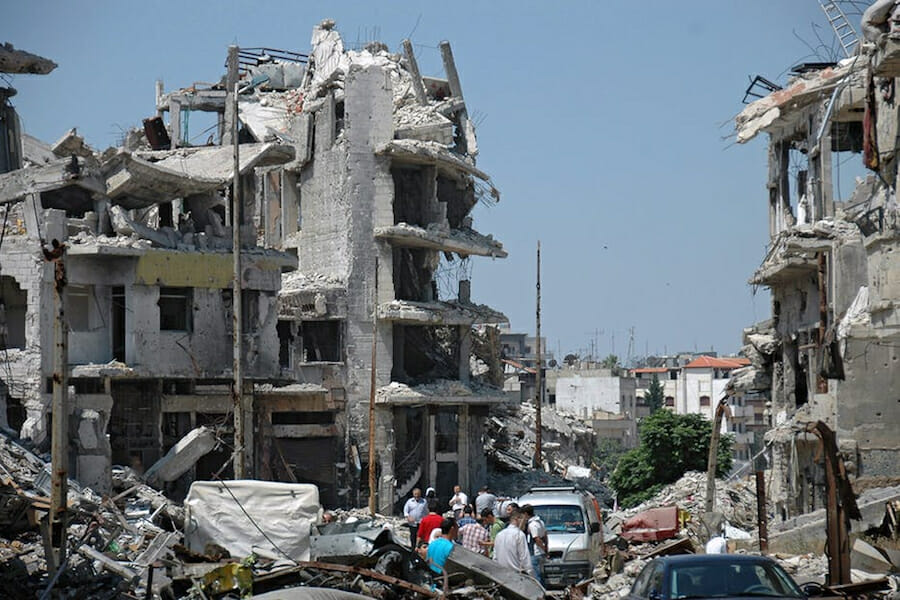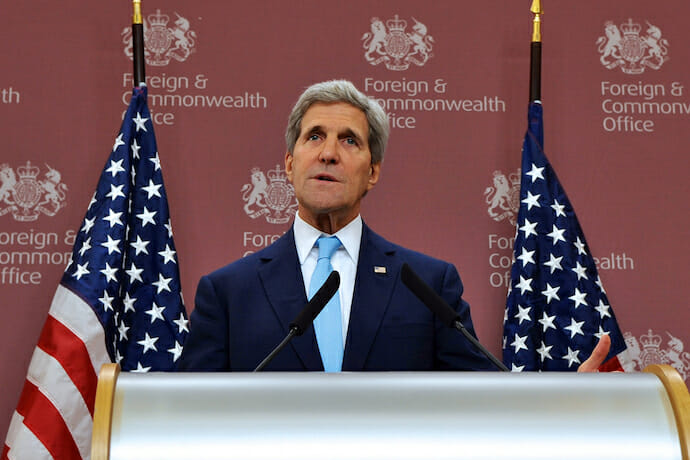
U.S. Shift on ICC and Syria Gives Hope but Skeptics Remain
The Obama administration has decided to back a push to have the International Criminal Court (ICC) open a formal, United Nations-sanctioned investigation into potential Syrian war crimes, according to a report by Foreign Policy.
Last Monday, it was reported that France had circulated a draft resolution to UN Security Council members to refer the ongoing war to the ICC for possible prosecution of war crimes and crimes against humanity. This news has been greeted with a mixture of surprise, relief, and a tinge of skepticism. The United States has had an ambivalent relationship with the ICC. The Bush administration infamously “unsigned” the Rome Statute yet later supported a Security Council resolution indicting Sudanese leader Omar al-Bashir.
As recently as last year, the US ambassador-at-large for war crimes issues, Stephen Rapp, advocated a special, ad hoc court to try alleged Syrian war criminals, thus undermining the raison d’être of the ICC.
Russia, a permanent Security Council member and supporter of the Assad regime, has also shown no sign of changing its attitude towards UN-sponsored action on Syria. Russia has already blocked three Security Council resolutions that would have condemned Assad’s government, threatened sanctions, and called for war crimes accountability.
Human Rights Watch’s International Justice Counsel Balkees Jarrah argues that “Russian objections to an ICC referral shouldn’t be seen as irreversible.” Yet Russia’s UN ambassador Vitaly Churkin’s response has been to reinforce Moscow’s stance, insisting: “Our position has not changed.”
ICC involvement is long overdue
It is unlikely that any vote on this issue in the Security Council will succeed. Nonetheless, the invocation of the ICC in the war in Syria is well overdue. The reports of war crimes and crimes against humanity, committed by all sides of the conflict, are well documented.
This is reflected in the draft resolution. The text calls for investigations into: “…the widespread violations of human rights and international humanitarian law by the Syrian authorities and pro-government militias, as well as the human rights abuses and violations of international humanitarian law by non-state armed groups, all committed in the course of the ongoing conflict in the Syrian Arab Republic since March 2011.”
This is the exact scenario for which the ICC was established: crimes that constitute “the worst of the worst,” which would otherwise go unpunished without the establishment of legal mechanisms beyond the state to prosecute violators. Thus, the court’s hitherto absence from this conflict has been frustrating and baffling in equal measure.
While some hope remains that the ICC will be able to bring a modicum of justice to this desperate situation, questions remain over Washington’s motives. Some advocates of the ICC are understandably optimistic that US support for a Security Council resolution represents a shift in its relationship with the court.
International relations research Mark Kersten is right when he notes that US involvement constitutes a “conversation changer”; that: “…there can be no backtracking on the part of the United States now that the discussion of an ICC referral has been reinvigorated.”
Self-interest offers multiple motives
Still, any optimism needs tempering. To begin with, the US Senate remains hostile to US membership of the Rome Statute. It is, however, the two assurances that the US sought in the referral that most starkly reflect the US “business as usual” approach vis-à-vis the ICC. First, the US indicated that it could support the text only after ascertaining that the ICC would have no authority to investigate any possible war crimes by Israel, which has occupied the Golan Heights since the Six-Day War in 1967.
Secondly, the US proceeded only after being assured that US personnel, possibly acting in a post-conflict peacekeeping role, would also be immune from prosecution.

US resistance to the ICC has long been premised on the idea that US military personnel are legally beholden to no authority outside the US, an idea underpinned by legal exceptionalism.
Furthermore, the US remains the only consistent defender of Israeli violations of international humanitarian law. The guarantees sought by the US are thus a continuation of US policies towards the ICC that are informed by self-interest and raison d’état, ideas that clash with the broader ideals of the ICC.
An as yet unexplored explanation for the US actions might lie in another conflict zone, Ukraine. The US, knowing full well that Russia (and possibly China) will veto any resolution that would result in Assad standing trial in The Hague, could be using the ICC, via the Security Council, as an alternative forum for putting pressure on Moscow.
Russia finds itself on the wrong side of international consensus on both Syria and Ukraine. At the same time, the US has been found wanting in both of these crises, be it its indecisive response to the use of chemical weapons in Syria or its acknowledged limitations in response to Russian agent provocateurs in eastern Ukraine.
Without a doubt, US support for referring Syria to the ICC is a tacit acknowledgment that efforts to bring justice and accountability to this conflict have failed. Though it would be preferable for the US to sign the Rome Statute and become a permanent participant in the court, this is unlikely in the foreseeable future.
Therefore, while we should applaud US efforts to bring accountability and justice (and one hopes peace) to the conflict in Syria, we should also be wary of Washington’s motives.
This article was originally published on The Conversation. Read the original article.

